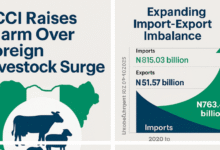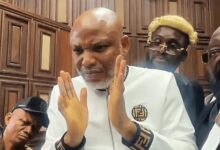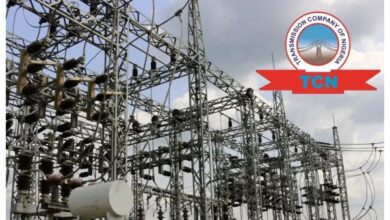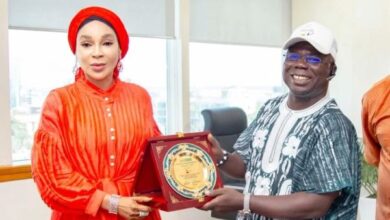How we got into trouble – CBN Governor
 The CBN Governor Mr. Godwin Emefiele, Weekend, had a chat with members of Nigeria Newspaper Proprietors Association of Nigeria NPAN. He spoke on efforts being made by government, monetary and fiscal policy authorities to revive the economy.
The CBN Governor Mr. Godwin Emefiele, Weekend, had a chat with members of Nigeria Newspaper Proprietors Association of Nigeria NPAN. He spoke on efforts being made by government, monetary and fiscal policy authorities to revive the economy.
Here are excepts. Nigeria is in recession, the first in decades or few decades, one or two decades. Things are bad, people are suffering, Mr. Governor, how did we get here?
Thank you very much for that question. I think I must apologise when you say that people are suffering. I must apologise that this is happening to our people, but I must confess that what is happening today is as a result of a global crisis. Global crisis in the sense that we have seen commodity prices dropping, we have seen geo-political tension, all around the world. Here you are talking about political tension between Russia, and Ukraine while indeed the US and EU are on one side watching.
Political tension between Iran and Saudi Arabia trying to play their game as usual; and of course the US Fed’s actions since 2009. Following the mortgage crisis of 2009 which started in the USA, there have been a couple of actions which , given the size of US economy in the world, has had certain impact, both positive and negative on emerging markets and frontier markets, where Nigeria unfortunately stands today.
But I think when you want to address the issue of how we got here, it is important for us to go back into history, go back into history to begin to tell ourselves or remind ourselves there was a time in this country when Nigeria survived only on revenues from agricultural produce, there was a time it survived from revenue from groundnut pyramids in the northern part of Nigeria, there was yet a time when Nigeria survived from the revenues from the western part of the country, and I am talking about from cocoa, to the extent that the tallest building at that time the Cocoa House, was built from the revenue of the export of cocoa, there was a time when this country survived with revenue the country generated from the production and export of palm oil and palm oil products in Nigeria from Mid-western and the south –eastern part of the country.
At that time, I am talking about the fifties and the sixties and indeed up to the early nineties, Nigeria was the largest producer and exporter of palm produce in the world.
Unfortunately, we abandoned these sectors because we found oil. I wish what we did at that time was to ensure that we held strong to our potential in the agricultural sector, if we had held strong to our potential in the agricultural sector, in the same vein held strong to the potential that we found because we found oil in Nigeria our story would have been different today.
Unfortunately, what happened was that, because we found oil, we let our guard down in the agricultural sector, and I will give you an example, this for me is a case of a country that unfortunately did not plan properly. Example is a country like Norway. Norway is a country with a population of less than five million people. Norway produces agricultural produce particularly fish.
It produces and exports fish today, Norway produces also crude oil, to the extent that today Norway is a country that has one of the highest investments in the sovereign wealth funds. Norway indeed has $873bn in its sovereign wealth funds. Notwithstanding having $873bn in its sovereign wealth funds Norway also takes very seriously the output from fish production, to the extent that the country survives on an annual basis, from revenue that it generates from the export of fish (aqunculture).
For class ‘A’ bureau-de-change, Central Bank was allocating $1m per week, for class ‘B’ bureau-de-change, Central Bank was allocating $750,000 per week, and for class ‘C’ bureau-de-change, Central Bank was allocating $500,000 per week to each bureau-de-change to the extent that between 2005 when Central Bank of Nigeria started selling dollar cash and 2016 January when we stopped it, the CBN had sold dollar cash of up to $66billion to BDCs.
In 11 years, CBN allocated $66bn averaging $6 billion per year. If this didn’t happen, we would comfortably be having well over $90bn in our reserve account today and we will not be struggling to pay our bills today… If we had thought of other ways to utilize our reserves in 2008 when it was as high as $62bn perhaps certainly we would not be where we are.
Today we have a situation where at that time, me as an MD of Zenith, MD of the bank, a deputy Governor of Central Bank would call to quarrel with me to say why was I not coming to Central Bank to collect Dollar cash to sell to bureau-de-change.
I was called and asked why some people in Kano, some people in Port-Harcourt and in Lagos were calling to say Zenith Bank was not selling Dollar cash to bureau-de-change but of course the bank didn’t see any serious need to disburse Dollar cash to bureau-de-change at that time. That was what we did with part of our $62bn.
I go further, between 2009 or 2010 and 2014 of course you remember 2009 was when we had the crisis, when it started with Lehman Brothers collapse, America pumped a lot of money to stimulate the economy, and as a result of pumping that money, some of those funds flowed into emerging markets including Nigeria.
At that time again Nigeria removed all forms of capital control to encourage the flow of capital into Nigeria. So what happened during that time, in 5 straight years we saw crude price at above $105 per barrel for 5 straight years
Read more at: http://www.vanguardngr.com/2016/09/got-trouble-cbn/Read











